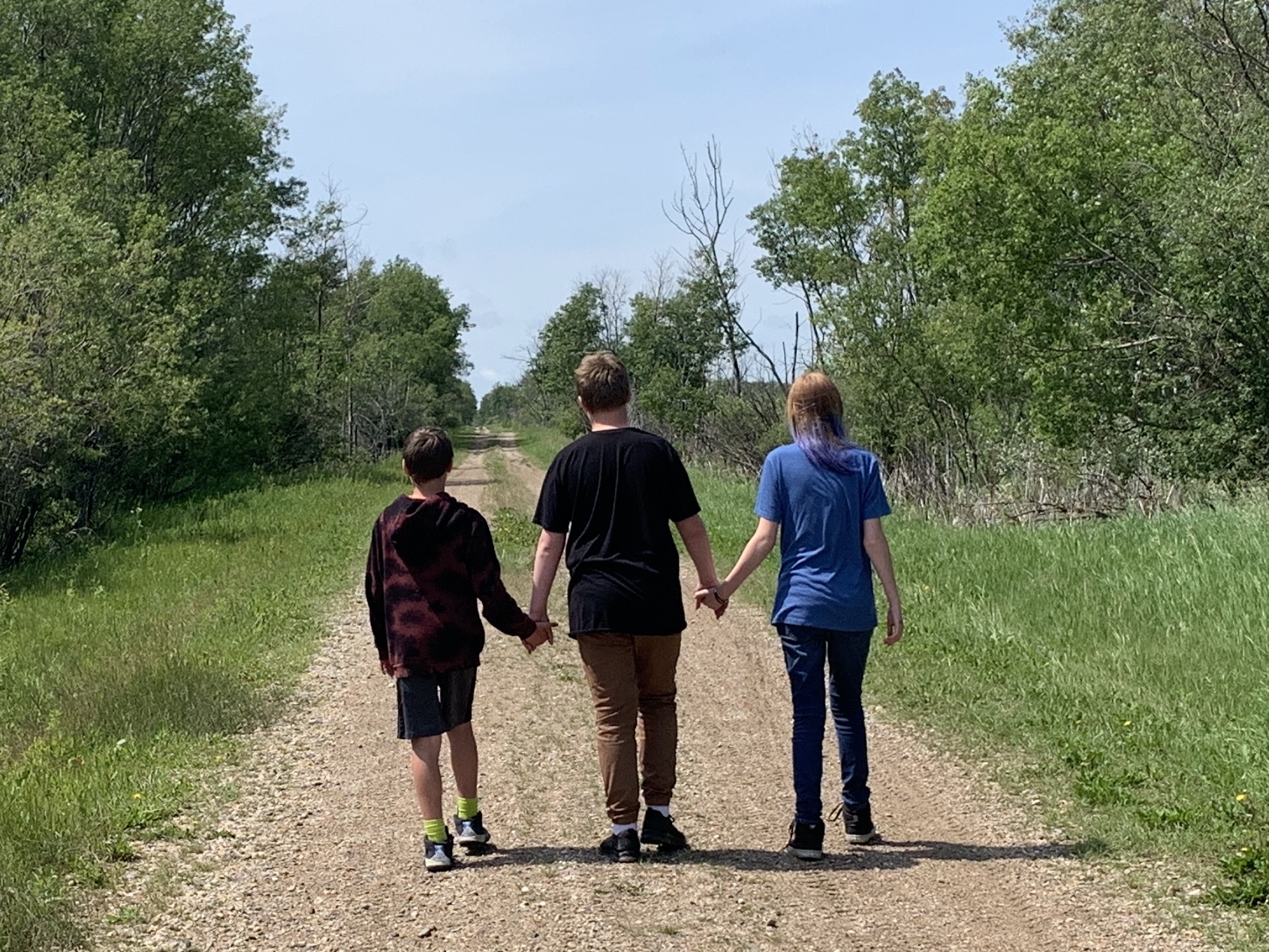As part of a new CNIB blog series, we’re talking to parents (and their children!) about their experiences parenting with sight loss and/or growing up with a parent who is blind or partially sighted and/or parenting a child living with sight loss. In our first installment, Ashley Nemeth and Rhonda Underhill-Gray dive into the complexities of motherhood and what it’s like to witness their children grow into teenagers and young adults.
Ashley Nemeth is the Manager of Programs and Operations at CNIB Saskatchewan and Manager of Programs at CNIB Manitoba and Rhonda Underhill-Gray is the Program Lead for Beyond the Classroom & SCORE at CNIB Ontario South (GTA).
Tell us about your family.

Ashley: My husband of 17 years and I have three amazing children aged 13 (boy), 14 (boy), and 17 (girl). Our oldest is going to be graduating this year which just seems crazy to us. I often get asked if they are all mine when we are out, and I have to laugh because three are not that many. But I think it is because I am blind.
Rhonda: I’m married with a sighted husband, and our two boys Christopher, 31, and Jonathon, 28, are now men… at least in their minds! Recently, Chris got married, so I now have a daughter-in-law as well.
What is one thing you wish you’d known before you became a parent?
Ashley: That the hard part of raising children is not when they are a newborn and a baby. The real tough stuff starts when they become pre-teens and teens. Many people made it sound like the hardest part of raising children or becoming a parent was going to be those first few months or the first year. But as my kids have gotten older, I would say that pre-teens and teen years have challenged me in ways I could not even imagine.
Rhonda: You hear how much you will love them, but I was not ready for the intensity of those consuming feelings. And even the sense of wanting to take care of them now that they are adults is still very strong. As they build their families, I have a sense of pride as they chose strong, competent partners for their mates.
What’s the best thing about being a mom?
Ashley: Being able to experience my children growing up into incredible people, all with their own personalities. It has been amazing to see them grow and change and witness how they face challenges and celebrate their successes.
Rhonda: There so many great things about being their mom. I truly respect, admire and like the men that they have become. I enjoy their company and I like chatting with them regularly, especially right now when we can’t physically be together.
What piece of advice would you give to other parents with sight loss?

Ashley: Being blind or partially sighted does not mean you will miss out on things as your child grows. You will experience it differently, but I mean, who likes to follow the crowd anyway!? I have been asked many times if it makes me sad that I don’t know what my children actually look like and can’t see them as they change and grow. But why would I be sad? I experience their laughter changing, and their personalities – there is so much more to our children than the way they look, so no, I don’t miss out.
Rhonda: Your life may look different from the outside but know that every family unit is different, and you can find a way to make most things work for your family. People may see parenting with sight loss as the big difference in your family; however, remember every household has different challenges. And there are many amazing adults raised by parents with sight loss.
What do you wish more people knew about parenting with sight loss?
Ashley: That it is possible and that as parents, we can be just as successful as anyone else, and our kids are happy, safe, and well adjusted. I think people feel bad for kids who have blind parents, but I actually think it is such a blessing for our children. My kids have grown up to be some of the most compassionate, empathetic people I have ever met. They have been able to experience what it is like to live with a disability, and now as they grow up and go into the world on their own, they will never be questioning how someone with a disability is able to do something because they know it can be done.
Rhonda: As someone who has a glass-half-full perspective, I think I look back to raising my boys with pleasant memories. We did many things as a family: camping, outings exploring Toronto and the Atlantic provinces. We went to the movies, joined Scouts, participated in school events, to mention a few. Just about all the things other families do!
Teachers and other professionals that worked with my family over the years were often the biggest obstacles. Some thought I was amazing. Others just saw me as a blind parent, not a parent who had sight loss (yes, there is a difference).
Some challenges included: barriers in the way of forms, letters and hand-written reports from the school year after year; homework assignments that I was unable to assist with; doctors who were not confident in my ability to administer medication to my children; teachers who thought I didn’t read to my children; and other parents who were reluctant to leave their children with me for supervised playdates.
I ask you to please see me as a person/parent/friend first, and my vision loss second.